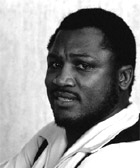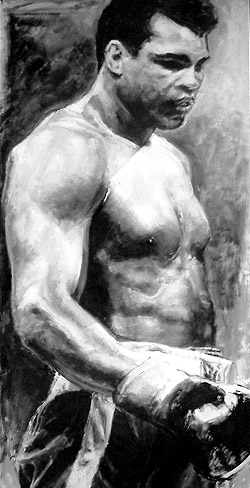
"Anybody black who thinks Frazier can whup me is an uncle tom," said Ali at the time. "Everybody who's black wants me to keep on winning."
"The only people rooting for Joe Frazier," he remembers Ali saying ," are white people in suits, Alabama sheriffs, and members of the Klu Klux Klan."
"Joe's such a decent guy," veteran trainer Futch said of Frazier before the fight, "but when he beats Ali, Joe is going to be to go down as one of the most unpopular black champions of all time."
"Joe Frazier became the symbol of our oppressors."
-Bryant Gumbel
The aftermath
Nothing near being so tenebrous in Joe's quarters. He was spending the last adrenaline of the fight that had been a tourniquet for the pain, the last rush still directed at Ali. "It was wild," Les Peleman said. "He was still out there in the ring. "Tears ran down his face as he kept walking in frantic circles, shouting:"I want him over here! I want t him to crawl to my feet! Crawl, crawl! He promised, promised me! Crawl to me, crawl! Why aren't you here?" Durham embraced him
A more just world would have celebrated Frazier a the "Cinderella man" of his era:the so twelfth child of a rural Gullah family, who highlighted it out of the South on his own at age fifteen, developed his superior strength hauling carcasses in a slaughterhouse, and prevailed over a more privileged, more popular, more physically gifted opponent through an iron iron display of will not seen before or since.
From the beginning, however, careful observers knew that the story want going to play out like that way. "Joe's such a decent guy," veteran trainer futch said of Frazier before the fight, "but when he beats Ali, Joe is going to be to go down as one of the most unpopular black champions of all time." Futch was right a s rain.
The next day Ali was public again, the X-rays were negative. He wanted his legions to know that he didn't lose, it was a bad decision, and that he had only trained for a six-round fight. He had shown remarkable heart and endurance, now with cameras grinding he was trying to steal the fight back from Joe, issuing some subtle, dippy call for a referendum, and he was succeeding. Privately, he was of another mind: "We been whupped. Maybe I'll get some peace now. We all have to take defeats in life." Joe watched on television at the Pierre, had Ali's comments read to him as he lay in bed. "It's not like I even won," he said. "He's robbin' me. Like nothin' changed!" He struggled to his feet. He tried to lift the TV set, to hurl it across the room. He was too weak. Durham guided him back to bed, saying: "Now, now, Joe. You know he aint got any sense." Nevertheless, Frazier continued to seethe. A commission doctor came by, suggested he be moved to a hospital in the Catskills. "What?" Joe said. "So he can make more headlines, show how he beat me so bad I gotta be put in a hospital?" Joe slipped out of the Pierre, to St Luke's Hospital in Philly. For twenty-hours, Dr James Guffe had him lay in a bed of ice. Joe dreamed a spirit had taken his hand, said he would be okay. "I could feel his touch. He was right there. "They told him the next morning there had been no visitors.
Let him live

His life hung out there for several days. His blood pressure was in another galaxy, and he had a kidney infection. Day and night, every five minutes, doctors scurried in and out of his room. They thought they would lose him to a stroke. Durham was in London on business, and quickly hustled back. But for a time, only Joe Hand, a cop and stockholder, sat out the nights with him.
"Let him live," Joe said to no one in particular. Joe stayed in a deep sleep, almost a coma. When he awoke, he mumbled over and over:" Don't say a word, Joe. Don't let Ali find out I'm here." At one point, four doctors lingered ominously over his bed. He awoke one time, and said: "All the money I made for people, and you're the only one here, Joe." Hand tried to comfort him, what could he say to a man on the brink? Finally, Joe broke through, like he had through Ali's mechanized jab, and he began to stabilize. One doctor sighed and said: "It was close." Joe stayed in St Luke's for three wekks.
Frazier had no reason to cower, to shrink from what he had done in that fight. He had nearly paid with his life. He had won with the kind of conditioning that, to attain it and keep it at such a keening level, would destroy most men. He had won with a fortitude only surpassed by men in war.
By 1971, Ali held sway over the young people who were quietly seizing the media. Byrant Gumbel was one of them. "It was a terrible terrible night," Gumbel says of that first Ali Frazier fighr. "I'll never forget it as long as I live.
Byrant Gumbel admits that he and his peers felt like 'the chosen ones,' the ones who had the unique skinny on the way the world turned. What he failed to see at the time was just how influential the chosen ones had already become, and how much more influential they would become in the future. As time passed, they would sing of this fight as just one more obstacle on Ali's heroic road back to the title. And as to Joe Frazier, they would remember him, when they bothered, as roadkill along the way.
A bad white mans decision
"Ali accepted the defeat with grace and dignity" - Bert Sugar
"It was a bad white mans decision"- Muhammad Ali
"Ali accepted the defeat with grace and dignity" - Bert Sugar
"It was a bad white mans decision"- Muhammad Ali
Although instinctively gracious in defeat, Ali soon yielded to the dictates of his ****** puppeteers and began to spin the sag of his loss in politically useful terms. On the Saturday after the fight, Ali told Howard Cosell on Wide World of Sports that he was the real winner of the fight. "He was declared the loser," Cosell recalls him saying, "only because of his religion and his attitude toward the draft."
Ali repeated this theme during the weeks and months that followed and started calling himself "The peoples champ." His supporters obliged by picking up the theme and merchandising it. Not content to strip Frazier of his authenticity as a black man, the Ali camp now tried to strip him of his authenticity as champion.
Is Joe Frazier a White Champion in Black Skin?"
"Joe Frazier became the symbol of our oppressors."
-Bryant Gumbel
Seven months after the first fight, Bryant Gumbel, the editor of Black sports, grafted on the temper of the day and stripped some more flesh from Frazier. He was a mediocre writer and thinker, excellent qualifications for the large success he would have on television's Today Show with a shallow, hard worked ultra-sophistication, a cool broker of opinion next to Howard Cossels weasly conniving. Gumbel never let a bandwagon pass without jumping on it or trying to blow out its tires, depending on the mood of the day; the ultimate limo *******. Durham said: "He's got soft written all over him, a country club black." Gumbel said he walked home after the fight with tears in his eyes for Ali; a hired weeping pallbearer for the times and its temporarily stalled hero. Strapping up his backbone, he wrote a piece meant to further Ali's campaign for the victory by proclamation, to blur Frazier's definitive prize: "Is Joe Frazier a White Champion in Black Skin?"
Talking about the other champions. he alludes to Floyd Patterson as the "go-boy" of the whites, blithely sniffs at Joe Louis, and finds that given the times, he can exonerate him as a model rep. He even manages to put some gloss on Sonny Liston, casts him as a "victim of society...hurt and angry...this was the black man of his day." Was Sonny laughing, punching a cloud; not bad, this behavioral reincarnation. But Frazier catches no slack. To Gumbel, he is pro-establishment, the E.Coli bacterium of the sixties. Joe calls Ali by his birth name, Clay. He consorts with an enemy like the South Carolina legislature, where he spoke, saying:"We must save our people, I mean black and white. We need to quit thinking who's living next door, who's driving a big car, who's my little daughter playing with, who is she going to sit next to in school. We don't have time for that." He added that he was hurt that so few blacks had had a chance to speak here in over a century."
That was far too passive for the likes of Gumbel; guilt by association was the gig, and it is doubtful he even saw or read the fairly long, sincere speech. Gumbel then pulls out some questionable associates . Undiscerning when it came to pictures, Frazier posed with Mayor Frank Rizzo, the Comissar of Philly police known for the brutality-and Richard Nixon, the Old Nick of sixties evil. Gumbel would go on to have a privileged life in TV , with an ego and ambition that not even a mother could love, let alone colleagues.





Comment